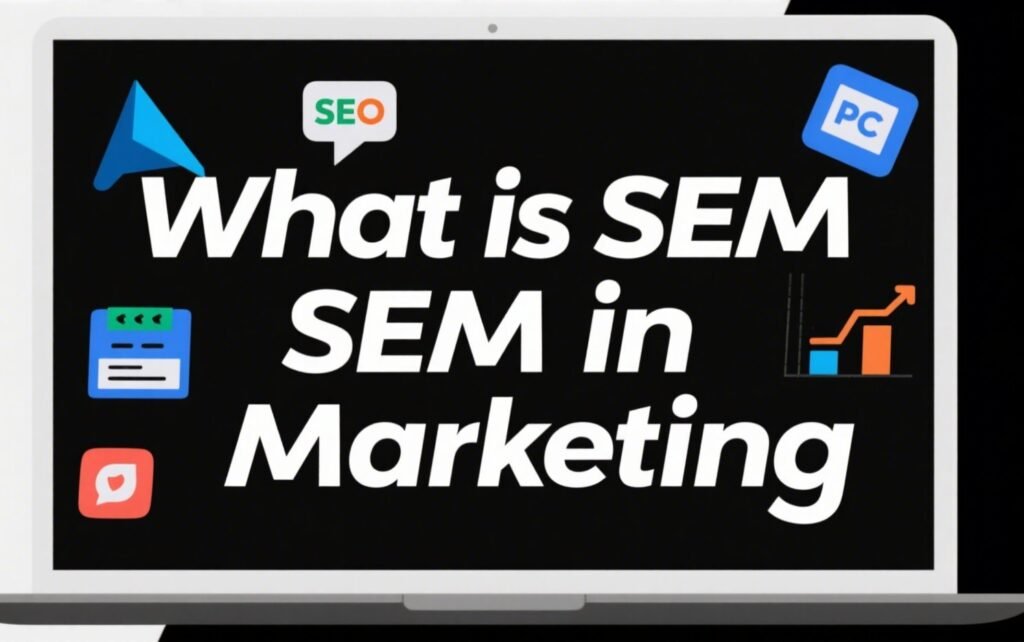In today’s digital age, understanding how to effectively reach customers online is essential for business success. One of the most powerful tools in a business’s digital marketing arsenal is SEM marketing, or search engine marketing. For UK businesses seeking to increase their online visibility, attract high-quality leads, and drive sales, SEM offers targeted and measurable solutions.
This blog will explore what SEM marketing entails, why it is critical for UK businesses, and how to implement effective SEM strategies that deliver real results. You will also find insights into key components such as pay-per-click (PPC) advertising, keyword research, ad targeting, and performance tracking. Finally, a comprehensive FAQ section will address common questions related to SEM marketing in the UK.
What Is SEM Marketing?
SEM marketing refers to the process of using paid advertising to appear in search engine results pages (SERPs). Unlike organic search engine optimization (SEO), SEM involves paid placements to ensure your business’s ads appear when users search for relevant keywords. Platforms such as Google Ads and Bing Ads dominate the landscape, offering businesses the opportunity to target specific audiences based on location, demographics, device, and even the time of day.
By investing in SEM marketing, UK businesses can gain immediate visibility at the top of search results, increase website traffic, and ultimately generate more conversions.
The Difference Between SEM and SEO
While both SEM and SEO aim to improve a website’s visibility on search engines, their approaches differ significantly:
- SEO (Search Engine Optimization) focuses on optimizing website content and structure to rank organically in search results. It is a longer-term strategy that requires ongoing content development, link building, and technical adjustments.
- SEM Marketing uses paid advertising campaigns to place ads directly in search results, offering instant visibility and control over targeting and budget.
Combining SEO and SEM can provide a balanced and comprehensive digital marketing strategy.
Why SEM Marketing Is Essential for UK Businesses
For businesses in the UK market, SEM marketing offers several key advantages:
- Targeted Reach: SEM campaigns allow UK businesses to target customers based on specific locations such as cities or regions, making marketing budgets more efficient.
- Measurable Results: Platforms like Google Ads provide detailed analytics and reporting, enabling businesses to track clicks, impressions, and conversions accurately.
- Cost Control: Pay-per-click models ensure that businesses only pay when users interact with ads, making it a cost-effective approach.
- Competitive Advantage: SEM allows smaller businesses to compete with larger competitors by bidding on relevant keywords and increasing brand visibility.
Key Components of Successful SEM Marketing Campaigns
To maximize the benefits of SEM marketing, UK businesses must focus on several critical areas:
Keyword Research and Selection
Choosing the right keywords is the foundation of any successful SEM campaign. Using tools like Google Keyword Planner, businesses can identify high-intent keywords that potential customers are searching for. Localized keywords relevant to the UK market, such as “best services in London” or “affordable marketing UK,” help target the right audience.
Creating Compelling Ad Copy
Effective ad copy is clear, concise, and persuasive. It must highlight unique selling points and include a strong call-to-action that encourages users to click.
Ad Extensions and Formats
Using ad extensions such as site links, call buttons, and location information can improve click-through rates and provide users with more information.
Bid Management and Budgeting
Setting appropriate bids for keywords and managing daily budgets ensure that the campaign stays within financial limits while achieving optimal reach.
Landing Page Optimization
Directing ad traffic to well-designed landing pages that match the ad message increases conversion rates.
Continuous Monitoring and Optimization
Regular analysis of campaign performance allows marketers to adjust bids, pause ineffective ads, and test new strategies for better results.
SEM Marketing Trends in the UK
The digital marketing landscape is continuously evolving. For UK businesses, staying updated on trends such as voice search, automation in bidding strategies, audience segmentation, and mobile-first advertising is crucial for maintaining a competitive edge.
Common Challenges and How to Overcome Them
While SEM marketing offers many benefits, UK businesses may face challenges such as:
- High competition for popular keywords
- Managing campaign budgets effectively
- Creating ads that stand out in crowded markets
Solutions involve thorough market research, continuous campaign testing, and leveraging expert knowledge or agencies specialized in UK digital marketing.
How to Choose the Right SEM Marketing Partner in the UK
Finding a trusted SEM marketing agency or consultant can make a significant difference. Look for partners with:
- Proven experience in UK markets
- Transparent reporting and communication
- Customized strategies aligned with business goals
Frequently Asked Questions (FAQ)
What is SEM marketing, and how does it work?
SEM marketing is a form of online advertising where businesses pay to display ads in search engine results, targeting specific keywords to reach potential customers instantly.
How much does SEM marketing cost in the UK?
Costs vary based on industry, competition, and keywords. Pay-per-click pricing means businesses only pay when users click ads. Budget flexibility allows campaigns for various business sizes.
Can small UK businesses benefit from SEM marketing?
Absolutely. SEM allows even small businesses to compete by targeting local or niche keywords with controlled budgets.
How long does it take to see results from SEM marketing?
Results are almost immediate once campaigns go live, but optimizing campaigns for better performance is ongoing.
What is the difference between SEM and SEO?
SEO focuses on organic ranking through website optimization, while SEM involves paid ads for faster visibility.


